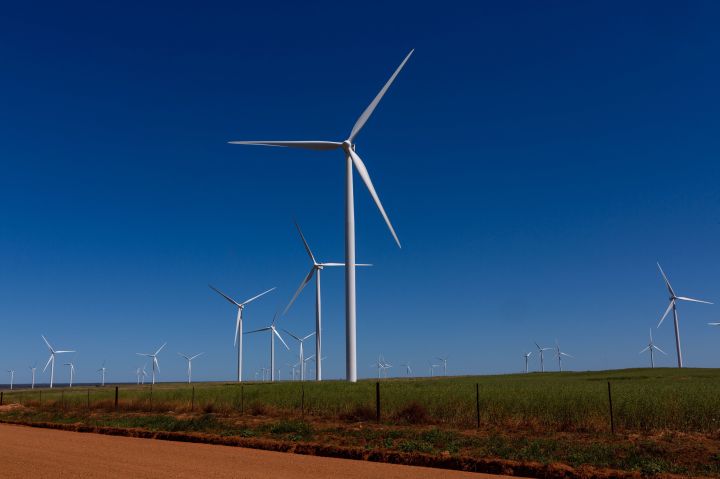REALITY CHECK OP-ED
Climate conferences and the just transition – there’s no such thing as a level playing field (Part One)

A common flawed assumption by Western activists – and on many occasions they have unsophisticated ventriloquists in the South – is that transitions are happening on economically level playing fields. They are not. This is the first of a two-part article.
‘To be wise, one must know what one knows, know what one does not know, know what can be known and know what cannot be known at a given time or place” – Robert Steinberg
Global climate action requires friendship, deep cooperation and reciprocity to succeed. Instead, it will increasingly be bent by the arc of geopolitical fracture and frictions of opposing expectations between different interest groups, which is bound to shape the pace and nature of global collective action on our climate.
All of this requires wise counsel and navigating – none of which guarantees the optimal outcome.
The common stance on the issue of just transitions is to treat them as if frictions do not exist, or opponents have no validity to the views they hold, or frictions will go away as proponents make the flawed assumption that everybody sees it as a no-brainer – the idea that switching to clean energy is cheap and cost-free.
The reality is, as is becoming more evident with time, that it is not cost-free and transitions have wider economic ramifications and are not limited to the electricity sector alone.
Just transitions are meant to be scaled up and rapid, unlike any other forms of technology transitions, which were gradual. So, the potential for job reallocation mishaps is high; missteps and the propensity for confirmation bias can cloud reality.
Just transitions are happening in an era of growing inequality and political populism that will feed the conveyor belt of misbeliefs and misinformation.
Winners and losers
There are going to be losers and winners. There will be social dissonance.
Transition debates are also ideological in that they are what the economist Guy Standing would call “the new politics of paradise” – for some, paradise should remain as it is, and for others, it is waiting at the other end of the transition to net zero.
But the truth is that we simply do not know. So, there should be neither waiting, as it is, nor should it be said it is not feasible. And claims should not be made that nirvana is waiting at the other end.
Developing countries want to avoid transitions imposed upon them at a pace they cannot afford, and some are even arguing they should be given room to extract fossil fuels to meet their development obligations.
Take, for example, the fact that many developing countries need to increase housing stock for their growing populations. For this, concrete, steel, cement and other materials will be required. Steel production alone contributes about 7-8% of greenhouse gas emissions – should we stall construction until we reach the right carbon intensity?
It is estimated that we would need to bring the global stock of steel alloy to 144 billion tonnes – four times more than we have produced since the beginning of human life – to meet future demand. The average for developed world standards is 15 tonnes per person.
At present, the average for China is seven tonnes and for Africa, it is one tonne.
The global population is expected to peak around 10.8 billion by 2080 – a quarter of the world’s population will be in Africa (drawn from Ed Conway’s book, Material World).
Even the meaning of development within a national sphere is itself a subject of numerous debates between different experts, national stakeholders and interest groups.
Development needs
Few countries have produced development outcomes that have not left some people behind. A common flawed assumption by Western activists – and on many occasions they have unsophisticated ventriloquists in the South – is that transitions are happening on economically level playing fields. They are not. And so, understanding the development needs of countries is far more pivotal than an absolutist approach to tackling climate change and development.
An important question to ask when co-joining emissions goals with development goals is: what is the development gap? And how can it best be met in a decarbonising world? What does full employment look like under these new conditions?
The question here is, which transition comes first – the national economic transformation agenda or the climate agenda? The answer could be both, or one first and then the other. Different contexts will dictate different outcomes.
Mobilising global collective action simply based on a virtue works when all claims on needs are already met – just like in Maslow’s hierarchy. It is wholly naïve to assume it will be the same for people who might not have bread or milk on the table tomorrow.
This is why a coal mining job that is worth 20 or 30 years of employment is seen as a better prospect (a bird in the hand is better than none) than what is perceived as transitory jobs in the renewables sector and in geographies that may force job hunters to relocate.
Countries that are not diversified enough will continue to depend on the production of fossil fuels until they can transition the existing economic dependency to become less reliant on fossil fuels for their economic wellbeing. Some countries have no choice, as their entire government budgets depend on fossil-fuel production revenues.
Oil and gas production peak
Fatih Birol, head of the International Energy Agency, understands this and notes that oil and gas production will peak – or at least still be part of the global energy mix – by 2050.
Oil and gas companies spend $800-billion a year on production. Birol admits that given the scale of investments, we are heading for a 2.4°C world.
All of this is on the assumption that fossil fuel revenues are not siphoned off by the elite and corporations engaged in energetic profit shifting. And where does the money sit?
What we see being argued for here by old, emergent and new oil and gas countries is a two-stage approach – first transitioning out of oil and gas dependency (or at least giving it primacy) while building a net-zero diversified and industrial economy from this extractive bounty.
For diversified economies, fossil fuels are an input that can be paid for through other forms of economic activity.
Oil and gas are the main economic activities and sources of foreign exchange for less diversified or weakly diversified economies. And so its depleting resources and sources of revenue have to, by necessity, stand on structural reforms that build an alternative economy to replace what will be lost.
This takes years and requires high levels of domestic pressure and forms of democratic accountability.
Oil and gas-producing countries have a narrow window of opportunity as more advanced and industrialised economies speed up the lowering of dependency on fossil fuels.
Getting to net zero
There are lots of ifs and buts on this – it also depends on how fast the world gets to net zero, and it is anybody’s guess at present what can be accomplished by 2050. Some countries, like India, are talking about reaching net zero by 2070.
Brazil is debating what to do with its newfound oil, and even though it has a diversified economy, it is still a developing country. President Luiz Lula da Silva is seen as a progressive leader, and, compared to former president Jair Bolsonaro, a champion of collective global climate action.
Lula, who was at COP28, was at pains to explain Brazil’s dilemma of upholding environmental protection and needing to pump out oil to meet its development needs.
The Brazilian state-owned petrochemical company, Petrobras, plans to produce five million barrels a day. It will make Brazil the fourth largest producer of oil in the world.
Talking about moral hazards: Brazil, Venezuela and Guyana are close to going to war over the disputed Essequibo River territory on the Brazilian border, in which Guyana has been the latest country to salivate over its new-found oil reserves. Venezuela is claiming the Essequibo as its own.
The vice-president of Guyana, Bharrat Jagdeo, had this to say about his country’s estimated $750-billion worth of oil reserves: “We need money from the oil and gas sector to climate-proof our country and adapt to climate change.”
And why should these economies not argue as they do? After all, rich countries, having the privilege of being reserve currencies, are already embarking on their two-stage process. On the one hand, they are still scouring the world for oil and gas, and on the other, injecting vast resources into new green industrialisation.
This is why the US and the EU have the Inflation Reduction Act and the Green Deal – the more you move to net zero the more you touch the raw nerve of established economic interests, which includes the interests of labour and households.
Transitions have to offer something more substantive than moral virtues and glib rhetoric about green jobs.
Those who control the finances, enjoy industrial capability and can churn out the technology have an advantage over those who do not have this privilege. DM




















 Become an Insider
Become an Insider
Comments - Please login in order to comment.